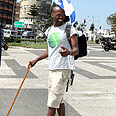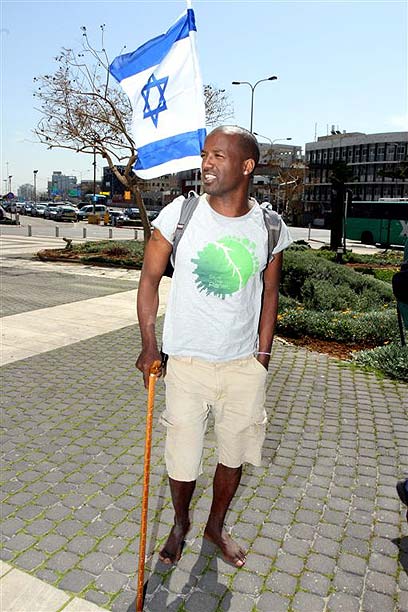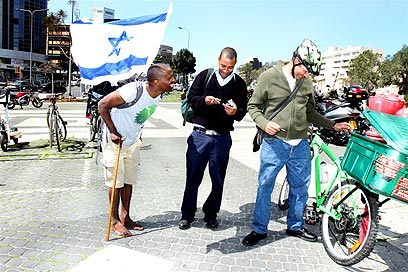
Avraham in Tel Aviv
Photo: Ofer Amram
Yayo Avraham has taken it upon himself to stand up for Israel's
Ethiopian community, opting to shine a spotlight on his community's problems by marching barefoot from Netanya to Jerusalem this week.
"It demonstrates the pain of the entire community," Avraham said Thursday as he made a stop in Tel Aviv.
Immigrant's Pain
Danny Adino Ababa
Op-ed: Ethiopian-born journalist fears his three children will always feel foreign in racist Israel
"My ancestors walked barefoot from Sudan, our biblical fathers walked barefoot. It's about connecting to the earth," he explained.
About a month ago, Avraham and other activists set up a protest tent outside Prime Minister Benjamin Netanyahu's Jerusalem home to rally against growing racism in the country.
"A brave woman came up with the idea and I joined her from the first day… We're not going to move until we get answers to our questions," said Avraham. "We live in a civil society that's approaching new limits which don't take into consideration the different and the immigrants, and we're tired of it."

Yayo Avraham in Tel Aviv (Photo: Ofer Amram)
Avraham, a Jerusalem resident, explained his decision to begin his journey in Netanya because, as he claims, "95% of students at the Rambam Elementary School in Netanya are children of Ethiopian immigrants."
"It's sort of a modern-day ghetto where they put all of the Ethiopians in one place," he added.

Marching for rights (Photo: Ofer Amram)
As for the protest tent in Jerusalem, Avraham remarked that "No one pays attention to us over there. Bibi doesn't. Only Knesset members (Shlomo) Mula and (Nachman) Shai and Jerusalem mayor (Nir) Barkat were there."
According to Avraham, the Ethiopian activists have encountered problems. "The police and Jerusalem Municipality were trying to evict us from there. After we filed a petition they stopped the eviction," he explained.
"I only want to say that this nation is racist. I went to the Ethiopian embassy and the ambassador said I wasn't allowed to be there because it's a public area. We argued for nearly 20 minutes. It's hard to change the opinions of adults, but when young people come there is dialogue."
Avraham said he expects members of the government to "become more connected to the people. For Bibi to come to the tent the same way he solved the problem of the girl from that South Lebanon Army family. To dissolve the ghettos, to solve the problems of the community's students and to restore the Ethiopian's dignity."















